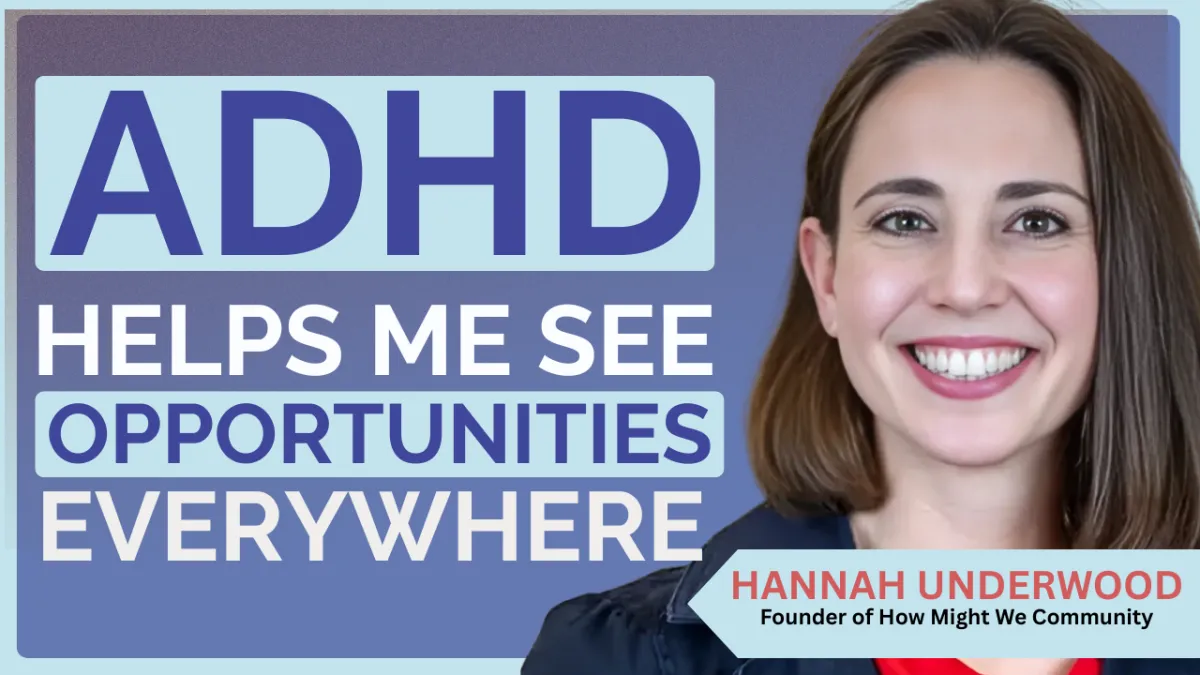Rocket Ship Founder Podcast
Rocket Ship Founder is my weekly podcast dedicated to supporting Founders on their journey. Episodes are short (around 12 minutes) but high value. Each week I dig into a particular topic on Founder life. Special focus on helping ADHD Founders, building great offers and reliable lead flow. Enjoy!
Previous Posts and Podcast Episodes

Can ADHD in Entrepreneurs Be a Competitive Advantage
ADHD in entrepreneurs is a common yet often misunderstood topic. Many entrepreneurs with ADHD face unique challenges such as staying focused, organizing tasks, and following through.
However, ADHD can also offer strengths like creativity, quick problem-solving, and the ability to spot new opportunities. Understanding how ADHD affects entrepreneurs can help them manage these challenges and use their strengths to succeed in business.
Hannah Underwood, the founder of How Might We Community, brings a wealth of experience in navigating ADHD as an entrepreneur. She has spent years working with data and human connection to drive social change.
From CEO of a youth charity to leading a tech startup, Hannah's journey showcases how ADHD can be both a challenge and an asset in the entrepreneurial world. Her insights offer valuable lessons on managing ADHD and leveraging its strengths.
In this article, we'll explore how ADHD impacts entrepreneurs in terms of creativity, focus, and execution. We will also look at practical strategies to manage ADHD, including setting clear goals, creating routines, and building strong support networks.
How Can Data Drive Social Impact in Charitable Organizations?
Charities often focus on stories to show how they help others. However, data can take this further by improving their efforts. It may seem hard initially, but data can help charities work smarter and achieve more.
Image Credits: Photo of Hannah Underwood from Linkedin
The Power of Data in Non-profit Organizations
Data might seem complicated, but it can be a helpful tool for charities. By focusing on curiosity, organizations can ask key questions to guide their actions. Instead of being scared of the word "data," think of it as a way to help make better decisions.
Some of the questions data can help answer include:
How can we use our resources better?
What methods are making the most difference?
How can we improve our work?
Data helps charities make informed decisions and work more efficiently.
Real-World Examples of Data in Action
The key is a youth charity in the northeast UK. Used data to cut costs while still helping more people. They asked themselves a learning question: How could they reduce the cost per person without affecting the quality? This approach helped them find a problem.
Their team had been entering fewer people into their system than they had helped. Once they fix this, they can reach more people and make a bigger impact.
Data shows that charities can improve. Organizations can do more with less by asking the right questions and looking at the results. Embracing data helps them achieve better outcomes and reach their goals faster.
How ADHD in Entrepreneurs Affects Work and Life
ADHD can impact many areas of life, especially work. It affects how people approach tasks, creativity, and balancing responsibilities. Understanding how ADHD influences daily life can help people manage their personal and work lives more effectively.
Image Credits: Photo of Hannah Underwood from Linkedin
Recognizing ADHD in Everyday Life
ADHD often goes unnoticed until life gets busier. As responsibilities grow, people may see ADHD traits, like difficulty focusing and managing many tasks simultaneously. This can become more obvious when juggling work, family, and personal goals.
Common challenges related to ADHD:
Struggling to focus on tasks for long periods
Difficulty organizing daily activities
Feeling mentally drained after managing numerous responsibilities
Workplace Impact of ADHD in Entrepreneurs
ADHD can be both a challenge and a strength at work. Many entrepreneurs with ADHD can quickly generate ideas and handle many projects.
However, staying focused on one task for a long time is often difficult. ADHD may cause stress, disorganization, and trouble finishing long-term tasks. It can also make it hard to meet deadlines or stay organized.
Neurodiversity in Entrepreneurship
ADHD is common in tech startups, where quick thinking and creativity are crucial. Entrepreneurs with ADHD may find these environments suit their thinking style. However, ADHD is less common in traditional sectors, like non-profits or charities.
ADHD in the entrepreneurial world:
Many successful entrepreneurs with ADHD thrive in fast-paced, creative industries.
Neurodiverse leaders bring fresh perspectives to problem-solving.
Addressing ADHD in Entrepreneurship
Although ADHD presents challenges, it can be managed. Entrepreneurs can succeed by seeking help, using their strengths, and building supportive environments.
Recognizing ADHD early and understanding its effects can help entrepreneurs balance personal and professional demands.
Managing ADHD in Entrepreneurs Effectively
ADHD can make it hard for entrepreneurs to stay focused and on top of tasks. Still, there are ways to manage these challenges and get more done.
Image Credits: Photo of Hannah Underwood from Linkedin
Tools and Techniques for Managing ADHD Symptoms
Even if you don't have a formal ADHD diagnosis, some strategies can help you manage your symptoms and stay on track.
Setting deadlines: A clear deadline or commitment, like a big presentation or a project, helps you focus. These "accountability hand grenades" push you to get things done under pressure.
Predicting behavior: Recognizing when you're most focused during the day helps you plan important tasks. For example, if you know you focus best in the morning, tackle hard work.
Breaking work into chunks: Instead of getting overwhelmed, break tasks down into smaller steps. Focus on one thing at a time, and staying productive is easier.
The Power of Routine and Community Support
A good routine is essential when managing ADHD. Setting regular work times, like joining a co-working group, adds structure. Even when your energy drops, scheduling short bursts of work, or "sprints," can help keep you focused.
Having others around to work with gives a sense of accountability and support. Knowing you're not alone is motivating, especially when you share the same struggles.
Embracing ADHD in Entrepreneurs
ADHD doesn't have to hold you back. You can turn challenges into opportunities by using the right tools and creating habits that work for you. Pay attention to what works best for you, and make those strategies part of your daily routine.
Advice for ADHD in Entrepreneurs Starting a Business
Starting a business with ADHD can feel overwhelming, but it can also bring unique strengths. With the right approach, you can turn these challenges into your advantage.
Image Credits: Photo of Hannah Underwood from Linkedin
Support Systems for ADHD in Entrepreneurs
One of the best things you can do is create a support system. Whether you work alone or with a team, having people around you who believe in your vision is essential.
This group can provide accountability, encouragement, and advice when things get tough. It's not just about seeking help but also about building a network that pushes you forward.
Leverage ADHD Strengths
ADHD often helps entrepreneurs spot new opportunities and think outside the box. This creativity is a huge asset in business.
However, focusing on the right opportunities can be challenging with so many ideas. The key is to channel that creativity into action, turning your ideas into something you can work on step by step.
Focus on Execution
The biggest challenge for ADHD entrepreneurs is execution. It's easy to have big ideas, but following through is crucial. Here are a few tips to help you stay on track:
Set clear goals with deadlines.
Break down big tasks into smaller, manageable steps.
Create a system to track progress.
Surround yourself with people who excel in execution.
You can turn your ideas into successful business ventures by creating a balance between creativity and action.
ADHD doesn't need to hold you back. Embrace your strengths, seek support, and create structure to succeed in your business.
Conclusion
In conclusion, ADHD in entrepreneurs brings both challenges and opportunities. Entrepreneurs with ADHD often struggle with staying focused, organizing tasks, and following through.
However, they are also creative, energetic, and great at spotting new opportunities. These traits can be valuable when starting a business.
To manage ADHD effectively, entrepreneurs can use strategies like setting clear deadlines, breaking tasks into smaller steps, and sticking to a routine. Having a support system is also key.
Whether it's a mentor, peer group, or team, having people who believe in your vision helps keep you accountable and motivated.
It's important to embrace the strengths of ADHD, like creativity and the ability to think outside the box. At the same time, working with others who excel in areas like execution and organization can help balance out weaknesses.
ADHD doesn't have to hold entrepreneurs back. By understanding its impact and using strategies that work for them, entrepreneurs with ADHD can turn challenges into strengths.
They can build successful businesses and reach their goals with the right tools, support, and mindset.
FAQs
How can ADHD affect entrepreneurs' ability to focus?
Entrepreneurs with ADHD may struggle to focus on a single task for long periods. This can lead to distractions, impacting productivity. Setting clear goals and breaking tasks into smaller steps can help stay on track.
Does ADHD in Entrepreneurs make it harder to organize tasks?
Yes, ADHD in Entrepreneurs often causes struggles with organizing tasks. They may forget important details or miss deadlines. Using task management tools or creating a daily checklist can help manage this challenge effectively.
Can ADHD in Entrepreneurs be an advantage?
Yes, ADHD in Entrepreneurs can be a huge advantage. It brings creativity, quick problem-solving skills, and the ability to think outside the box. These strengths help entrepreneurs spot new opportunities and innovate faster.
What strategies can entrepreneurs with ADHD use to stay productive?
ADHD in Entrepreneurs can be managed by setting specific deadlines, breaking tasks into smaller chunks, and following a routine. Taking regular breaks also helps avoid burnout and improves focus.
How does ADHD in Entrepreneurs affect work-life balance?
Balancing work and life can be challenging for entrepreneurs with ADHD. Difficulty focusing and organizing tasks often affects both work and personal life. Creating boundaries and setting time for work and rest is key to maintaining a healthy balance.
STAY CONNECTED & KEEP LEARNING
Mastering focus and building a thriving business with ADHD doesn’t happen overnight, and you don’t have to do it alone.
Subscribe to the ADHD Entrepreneurs Newsletter on LinkedIn to get stories, tips, and ADHD-friendly strategies straight to your inbox to help you stay out of overwhelm, reclaim your focus, and achieve your full potential.
Copyright 2025 Steve August Coaching | All Rights Reserved

